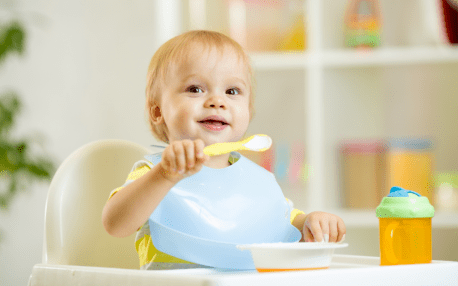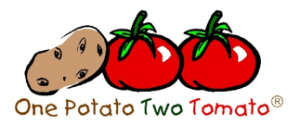From Bottles To Spoons
…Why adding and mixing solid foods into your baby’s bottle with milk or formula before you baby is ready to consume
solids is poor nutritional parenting.
“Put a little cereal in the bottle your baby will sleep better”, “rub a little scotch on your baby’s gums when they are teething,” “if your baby won’t sleep in the crib drive your baby around in the car every night to make them fall asleep.” We have all heard these recommendations or similar and maybe even done one or all of them at some point while raising children or knew someone that did. Recommendations for how to feed a baby or child have been passed down from either family, generation to generation, a friend, neighbor or friendly acquaintance. Sounds like helpful harmless advice, right? Maybe not? Just because someone gives us advice doesn’t mean its necessarily good advice. When taking advice on how to wean your baby from bottled liquids, formula to pureed and table solids make sure it is coming from a reliable educated or professional sound source.
The American Academy of Pediatrics (AAP) recommends breastfeeding (if able) or formula as the sole source of nutrition for your baby for about the first 6 months of life.
While the habit of adding cereal, meats, fruits, veggies and other carbohydrates to an infant’s bottle is one that has been around for a long time, there are several compelling reasons why you really shouldn’t do it unless advised by your pediatrician. Listed below are my top five.
#1 A Premature Gut:
A baby’s digestive system is not thought to be well prepared to process cereal and other foods until about 6 months of age. When he is old enough to digest cereal, he or she should also be ready to eat it from a spoon. If not, then they are not ready. It may take some time for the rooting reflex to readjust.
#2 Too much too soon:
Offering cereal and or other food groups in a bottle (or even on a spoon) before babies are developmentally ready can increase the likelihood of gagging and/or inhaling the thickened mixture into their lungs, possibly resulting in aspiration pneumonia. Unless there’s a medical reason for giving it early, it’s not worth jumping the gun.
#3 Activating Allergies:
Exposure to solid foods before the age of 4 months may put babies at risk for developing food allergies in the future—a risk that can be minimized by simply waiting until 4 to 6 months when the time is right.
#4 Texture Confusion
When a baby gets accustomed to drinking thin liquid formula or breast milk from the bottle and then it suddenly becomes thickened or thicker with food, it can lead to poor coordination and confusion in which the baby’s brain may not know how to quickly handle the liquid-solid mixture transition. This may result in the baby swallowing more quickly and gag or more slowly resulting in holding or pocketing the semi-solid liquid. This can create a negative experience that can further awaken and become more memorable overtime into the toddler years triggering food, texture and sensory aversions or difficulty chewing or swallowing.
#5 Overfeeding & Childhood Obesity:
Perhaps the biggest reason not to take the addition of cereal in a bottle too lightly relates to overfeeding. By instinct, your baby knows how much breast milk or formula to drink based on volume, not calories. While it is said to be difficult to overfeed a baby, this applies when you’re talking about breast milk or formula alone. As soon as cereal gets added in, things get a little murky—so murky, in fact, that putting cereal and other food groups in the bottle is considered by some to be a form of force-feeding that can cause babies to “overdose” on calories.

– By Laura Lynn Iacono MS, RD @ 1Potato@Tomato.com
